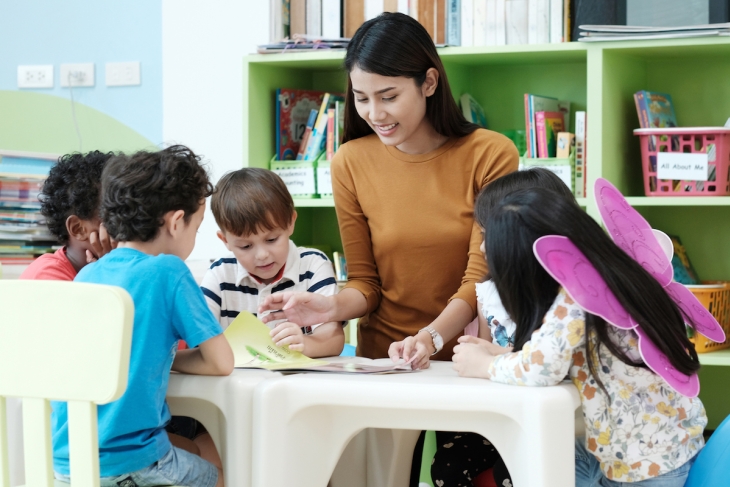To a degree most of us would prefer not to acknowledge, classroom practice tends to run less on research and empirical evidence than on some combination of philosophy, faith, or personal preference. But for those committed to a vision of teaching based on what we know about learning instead of habit or what we might wish to be true, Deans for Impact has produced a brisk and accessible guide for teachers, parents, and caregivers involved in early childhood education, which the report defines as spanning birth to age eight. It’s a worthy successor to the group’s touchstone 2015 report, The Science of Learning.
Written for “anyone who is interested in our best scientific understanding of how young children develop control of their own behavior and intentions, how they learn to read and write proficiently, and how they develop the ability to think mathematically,” The Science of Early Learning puts under one cover a summary of current research across three “domains”—literacy, numeracy, and “agency.” One dozen “key questions” are posed (e.g., “How do young children learn to count?” and “How do young children learn to self-regulate their behavior?”), each addressed on a single page with a list of “principles from learning science” that inform the answers—plus a set of “practical implications” suggested by the research. For example, on developing independence, one principle is “the need for independence is essential to human growth and learning.” The practical implication or guidance is that teachers “can help young children develop their independence by providing opportunities to make choices and decisions (within limits), and allowing them to experience the consequences of their choices.” Another cautions against “doing things that may inhibit young children from developing independence—such as offering incentives like sticker charts or rewards for good behavior—because the prize becomes the goal more than learning.”
One good sign is that the phrase “developmentally appropriate” (or inappropriate) appears not once in the brisk and efficient twenty-page report. Nor will you find false dichotomies between “play-based” and “academic” early childhood education in its pages, which overflow with helpful insights from avoiding long wait times between classroom activities (which tax little kids’ ability to self-regulate their behavior) to advice on helping children progress from concrete representations of numbers, to visual representations, to abstractions. Given the recent groundswell of concern over scientifically sound reading practice, the report is particularly strong on early childhood literacy, stressing the benefits of reading aloud to children, the development of print concepts (e.g., text goes from left to right across the page; matching spoken words to written ones), and mastering the alphabetic code in the earliest years. “Most children will not ‘naturally’ learn that the letters in the English alphabet represent specific sounds,” warn the authors, who include a pair of practicing teachers (Dylan Kane and Callie Lowenstein, Rachel Robertson of Bright Horizons, and a trio of academics, Daniel Ansari, Stephanie Carlson, and Anne Castles). “Systematic phonics instruction is the most effective, evidence-based way to ensure that young children learn letter-sound relationships.” The report also authoritatively dispatches any number of persistent myths about reading comprehension. “Children should read texts that are rich in content, not just about familiar, daily life contexts,” it notes. “Even young children benefit from learning about science, history, geography, and other cultures, and from reading classic stories that may be referenced in other works.” Somewhere, E.D. Hirsch, Jr. smiles.
When it comes to addressing—and hopefully, someday, reversing—the nation’s mediocre education performance, all roads lead to early childhood. It is there that the battle is mostly won or lost. Brisk and economical, but authoritative, the greatest strength of The Science of Early Learning is the extensive sourcing: Each “domain” is linked to over sixty studies inviting further reading, or you can just run with the principles and practical implications. In short, this is the very model of what it looks like to make educational research both understandable and actionable. More of this please, and bravo, Deans for Impact.
SOURCE: “The Science of Early Learning,” Deans for Impact (March 2019).

